The curious case of F1's 1,000th race
Formula 1 has been building up towards its 1,000th grand prix for some time. As far back as 2017, it started marketing the “Countdown to 1,000”, with an altering of the calendar to try and change its venue to Silverstone even being considered, such is the significance of the event.
The Chinese Grand Prix ultimately received the honour of hosting race number 1,000, which will take place this Sunday at the Shanghai International Circuit.
Actually: it will and it won’t. Depending on how you look at things.
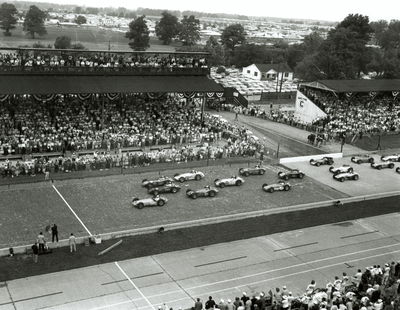
Formula 1 has been building up towards its 1,000th grand prix for some time. As far back as 2017, it started marketing the “Countdown to 1,000”, with an altering of the calendar to try and change its venue to Silverstone even being considered, such is the significance of the event.
The Chinese Grand Prix ultimately received the honour of hosting race number 1,000, which will take place this Sunday at the Shanghai International Circuit.
Actually: it will and it won’t. Depending on how you look at things.
The accurate definition is that Sunday’s race will be the 1,000th race to be part of the FIA Formula 1 World Championship. The first championship race was staged in 1950 at Silverstone, while Bahrain took the honour of being the last triple-digit race at 999 at the end of last month.
Naturally, this discounts all of the non-championship races that were held to F1 regulations but not part of the official season (the last being held at 1983 in Brands Hatch).
Non-championship races bring in the first set of ‘howevers’ into China’s status as staging the 1,000th grand prix. While it will be staging the 1,000th Formula 1 world championship grand prix round, it will not be the 1,000th Formula 1 grand prix.
F1’s roots stretch a little beyond the formation of the world championship in 1950, with the first set of regulations planned for 1947 being given a run-out at the 1946 Turin Grand Prix, which is widely regarded as being the first F1 race in history.
A number of grands prix run to F1 rules took place in the period leading up to 1950, meaning we’re already past the 1,000 mark by factoring in those alone.
Even when the world championship did come to full fruition in 1950, non-championship races soon became part of the season for drivers looking to expand beyond the set schedule. Hugely popular in the 1960s, the non-championship race became increasingly rare, as explored by the late, great Alan Henry in this feature for McLaren’s official website.
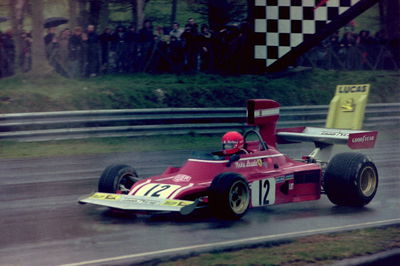
Come the mid-1970s, only the International Trophy at Silverstone and the Race of Champions at Brands Hatch (pictured above in 1975) remained, with the latter enjoying its last hurrah in 1983. Every grand prix run to F1 regulations since has been part of the world championship, although there are hopes of a revival to potential test out new rules or regulations.
Once again though, factoring these in, F1 grand prix number 1,000 came and went yonks ago.
The 1,000 mark in Shanghai is also skewed by a number of races in the 1950s that, while being part of the F1 world championship, were not technically F1 races.
From 1950 to 1960, the Indianapolis 500 was part of the F1 world championship despite being run to the American governing body’s regulations (AAA from 1950-55; USAC from 1955-60). The F1 regulars rarely bothered with an entry - Juan Manuel Fangio failed to qualify in 1958 - and for 1961, the race dropped off the world championship schedule. Even so, that’s another 11 races off if we are counting China as the 1,000th world championship round run to F1 rules.
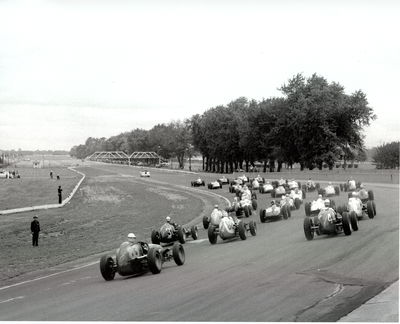
If they were discounted completely, then instead of celebrating race 1,000 at Round 3 of the 2019 season, we could do so at Round 14: the Italian Grand Prix at Monza, the track which has hosted the most world championship rounds. Would be more a touch more romantic…
However, if you were to discount the Indy 500s from the tally for not being run to F1 regulations, then you would have to remove the 1952 and 1953 seasons altogether.
Alfa Romeo’s decision to quit racing and BRM’s failure to get a team together left Ferrari as the only serious F1 contender, prompting officials to switch to F2 regulations for the year in order to boost grid numbers. It had the desired effect, keeping the world championship alive, with F1 regulations then returning in 1954 upon Mercedes’ arrival.
So if we remove the 11 Indy 500s from 1950 to 1960 and the 15 other rounds not run to F1 rules in 1952 and 1953, then China becomes race number 974. The honour of being race 1,000 would then be settled in the early part of the European season in 2020. If organisers wanted to tap into the history books, such a landmark event could perhaps go to a race such as the French Grand Prix or the British Grand Prix (assuming the latter is still a thing next year…).
We can then also get into the very murky waters of how many grands prix - F1 or otherwise - there have been. But once you factor in any series or event that uses the ‘grand prix’ moniker - IndyCar and MotoGP are just two - it loses any real significance.
China may be celebrated as race 1,000, but that point was passed ages ago or is still over a year off, depending on how you want to look at it.
But we as humans like to keep things as straightforward as possible. From a simple point of view, taking the beginning of the world championship at Silverstone in 1950 as the starting point, China is race number 1,000.
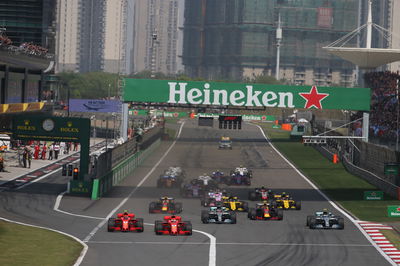
LANDMARK MOMENTS
China has a tough act to follow for some of the recent big ‘landmark’ races. Race #700 was the 2003 Brazilian Grand Prix, a crazy affair that saw the race end early after a number of big crashes, with nobody quite sure who the winner was. Kimi Raikkonen initially took to the top step of the podium for McLaren, only for officials to then find under the regulations that Jordan’s Giancarlo Fisichella should have been declared the winner. Fisichella was retroactively declared the winner five days later, and received his rightful trophy at the next race at Imola.
Fast forward another 100 races, and we come to the 2008 Singapore Grand Prix. Out of the 999 world championship rounds - carefully worded! - there have been, few can rival race #800 for its drama and controversy with the Crashgate scandal that saw Nelson Piquet Jr. deliberately crash his car under orders from the Renault team, allowing teammate Fernando Alonso to win F1’s first-ever night race.
By contrast, race #900 was memorable for all of the right reasons as Lewis Hamilton and Nico Rosberg fought out a thrilling battle under the lights at the 2014 Bahrain Grand Prix. It would only act as a taste of things to come in the bitter rivalry that played out between the duo over the three seasons that followed, but at the time seemed like a spectacular show between two old friends. Ah, the beauty of hindsight...
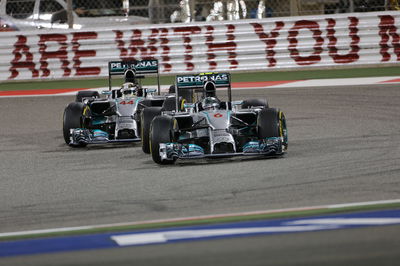
--
A tip of the hat must go to motorsport journalist Leigh O'Gorman for planting the seed for this feature on Twitter. You can check out Leigh's work at The Motorsport Archive.











